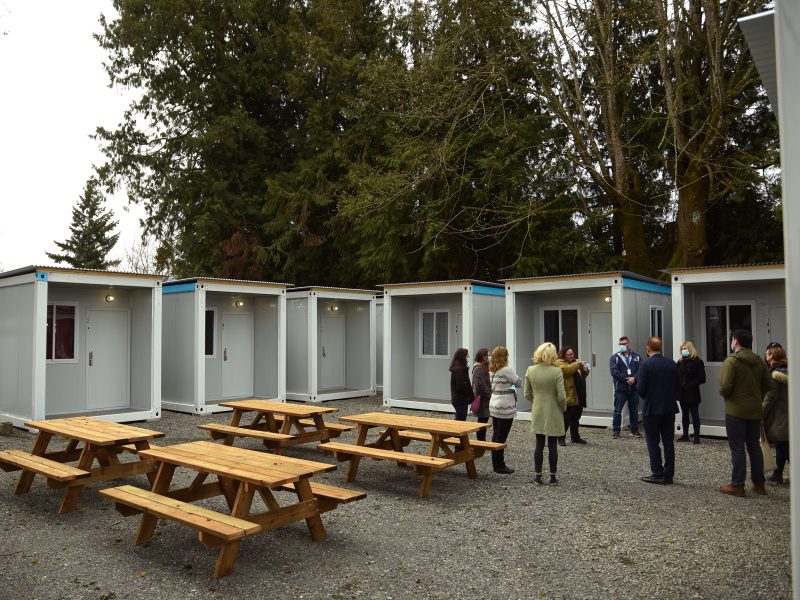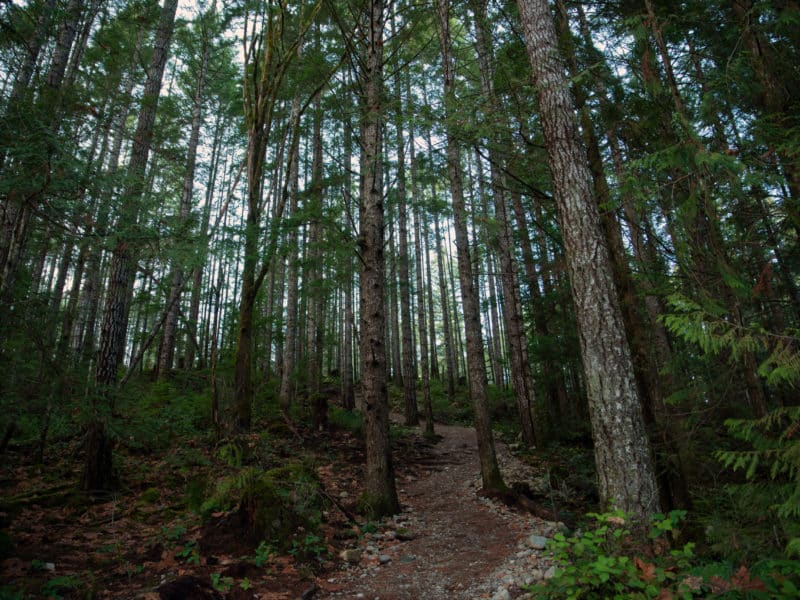
Months after the B.C. Supreme Court directed RCMP to respect journalists’ right to report on the Fairy Creek blockades, press freedoms are under attack again.
Two journalists were illegally arrested and detained by RCMP officers last week for documenting police enforcement on Wet’suwet’en territory in Northern B.C.
Award-winning photojournalist Amber Bracken and documentarian Michael Toledano were arrested on the afternoon of Friday, Nov. 19 and detained over the weekend until their Nov. 22 bail hearing.
In July, 2021 a coalition of media organizations, including The Discourse, took the RCMP to court to fight for journalists’ right to report and document enforcement actions at Fairy Creek on Vancouver Island. The coalition won the court challenge. RCMP had provided false information to the court in the lead up to the hearing, The Narwhal reported. Many of you, The Discourse’s readers, helped fund the legal fees for this case.
“On multiple occasions, courts and quasi-judicial bodies have been clear that restrictions on media are unjustified in a free and democratic society,” says Canadian Association of Journalists (CAJ) President Brent Jolly in a recent press release. “Whether through open defiance, or downright ignorance, the RCMP continues to act with outright impunity in defying these legal orders. This audacious subversion of Canadian law cannot — and will not — be tolerated.”
Why were the journalists arrested?
An early statement from RCMP about its enforcement operation on Friday, Nov. 19 says two individuals were arrested for breaching the injunction as part of a group and later identified as journalists. A new RCMP statement released on Nov. 22 says the two individuals identified themselves as journalists while being arrested and that the RCMP did not dispute this.
The Narwhal reports that RCMP used canine units and snipers when making the arrests and broke down the door to a tiny home with an axe before removing land defenders and journalists from the structure. Police also used a chainsaw to remove a land defender from a cabin.
In a Twitter thread, Toledano says he was “arrested at gunpoint” and in a separate tweet, he says satellite service was cut off by police before officers “breached” the tiny home.
Bracken was on assignment for The Narwhal and was provided with a formal letter of assignment from the news outlet. A tweet from Bracken two days before she was arrested shows images of her press pass taped to her gear.
According to The Narwhal, RCMP said they were aware journalists were at the site where Bracken and Toledano were arrested. Sleydo (Molly Wickham), a wing chief in Cas Yikh house of the Gidimt’en clan and Jocey Alec, daughter of Hereditary Dinï ze’ (Chief) Woos were among the 11 arrested.
In an email exchange, RCMP told The Narwhal “there shouldn’t be any issues” as long as Bracken was “clear with the members on the ground there.”
While Bracken did carry a press pass given to her by The Narwhal, it’s worth noting that there is no such thing as an official press pass in Canada, as there is no oversight body for Canadian journalists. Because of this, reporters aren’t required to carry a press pass, although the CAJ ethics guidelines say journalists must generally declare themselves as such. It’s up to RCMP to develop a process that ensures their officers know who is acting as a journalist and who is protesting during enforcement actions, Jolly said in a radio interview on CBC’s The Early Edition. During the Fairy Creek case the CAJ suggested police ask journalists to wear a yellow lanyard, for instance.
According to the CAJ, Toledano was also known to RCMP as a journalist and has been living in Wet’suwet’en territory for the past three years while working on a documentary.
Recent reporting from The Narwhal also reveals that RCMP tracked Bracken and Toledano in a police investigations database. Searches of Bracken and Toledano were conducted in the database on Nov. 19, 2021. Neither of them have a criminal record.
Last year, Bracken won the Charles Bury Award from the Canadian Association of Journalists for her “moral courage” in reporting the Wet’suwet’en crisis in face of threats of arrest and detention by RCMP.
The RCMP says both journalists were arrested because they were “embedded” with protestors, the CAJ reports. But this is not illegal. In 2019 and 2020, civil and criminal charges against APTN journalist Justin Brake — who was covering a protest from inside the Muskrat Falls site — were dropped after the Newfoundland and Labrador Supreme Court ruled in his favour.
In a 2019 decision, the judge emphasized the importance of “independently reported information” on Indigenous issues due to the underrepresentation of Indigenous peoples in Canadian media. “That makes freedom of the press to cover stories involving indigenous land issues even more vital.”
“[The RCMP’s] logic makes it impossible for frontline journalists to do their job without the threat of arrest,” wrote Carol Linnitt, co-founder of The Narwhal, in a tweet.
What’s being done about it?
The CAJ — along with more than 40 news outlets and press freedom organizations including The Discourse and IndigiNews — are calling on Minister of Public Safety Marco Mendicino to investigate the RCMP’s actions, instruct them to drop charges against Bracken and Toledano and to protect journalists’ right to report.
The organizations have signed this letter to Mendicino, and The Narwhal is calling on the public to send an email to the minister using this form here.
On Nov. 21, Mendicino posted tweets saying “journalists must be able to work free from threats, intimidation or arbitrary state action.”
“It would be wrong for any journalist to be arrested and detained simply for doing their vital work on our behalf,” Mendicino said.
Marc Miller, minister of Crown-Indigenous relations with the federal government, also tweeted that journalists “should not be held or detained any longer than is necessary to verify that they are journalists.”
In a statement, RCMP says they “did not arrest anyone for being a journalist or detain anyone for performing their job.” However, the statement does not clarify why Bracken and Toledano were detained.
Bracken was released from jail after a bail hearing in Prince George on Nov. 22, having agreed to respect the injunction (even though it doesn’t apply to her) according to The Narwhal. This bars her from reporting in the area until her court appearance in February 2022, unless charges are dropped. Toledano has also been released pending his trial in February, with the same conditions as Bracken, according to Ricochet Media.
Enforcement of Coastal GasLink injunction is ongoing on Wet’suwet’en territory
On Monday, Nov. 22, supporters of Wet’suwet’en land defenders who were arrested drummed, sang and danced outside of the Prince George Courthouse ahead of their bail hearing.
RCMP enforcement of the Coastal GasLink injunction has been ongoing, as reported by The Narwhal, with members of the media, Indigenous Elders and legal observers being detained. A Nov. 20 update from Gidimt’en Checkpoint says a total of 32 people were arrested over two days of enforcement.
Tensions have been rising in the area since September when land defenders on Gidimt’en clan territory occupied a site where Coastal GasLink was to lay pipe under a river, The Narwhal reports. RCMP made arrests between then and Nov. 14, when Wet’suwet’en hereditary leaders and land defenders re-enforced an eviction order against Coastal GasLink workers. On Nov. 14 they gave the company eight hours to evacuate its workers from the area, as well as a two hour extension.
The company didn’t act on the order and land defenders subsequently cut off an access route to Coastal GasLink sites and work camps, The Narwhal reports. The pipeline, which is about 50 per cent complete, would transport natural gas from Northern B.C. to the Pacific Ocean near Kitimat.
The land defenders and supporters are acting on the authority of Wet’suwet’en hereditary chiefs, who have been fighting against Coastal GasLink pipeline construction through their territory for years. Coastal GasLink has reached agreements with 20 First Nation elected band councils — including that of Wet’suwet’en — but Wet’suwet’en hereditary leadership say they maintain jurisdiction of their territory outside of reserves.
The Supreme Court of Canada confirmed Wet’suwet’en and Gitxsan Rights and Title in 1997, affirming that their ownership of the land was never extinguished, The Discourse reports. Wet’suwet’en hereditary chiefs assert that their legal rights come before elected council agreements with Coastal GasLink.
Protests in support of the hereditary chiefs took place across Canada over the weekend as enforcement ramped up again.
Further reading
- “Wet’suwet’en land defenders say B.C., federal inaction prompted enforcement of Coastal GasLink eviction” — The Narwhal. Check out this story for more background, a timeline of recent events and insight on how commitments to the UN Declaration on the Rights of Indigenous Peoples is related to this issue.
- “Arrests of media covering Indigenous rights are part of a continued effort to silence land defenders, legal experts say” — Toronto Star
- “RCMP tracked photojournalist Amber Bracken in active investigations database” — The Narwhal.
- “Why building a pipeline on Indigenous land is complicated, even if you own it” — The Discourse (2018).
- “Breaking tradition” — The Discourse (2017). This story on why consent from an entire community is important when getting First Nations’ approval for resource projects.
- “Pacific Northwest LNG court battle: ‘At jeopardy is our whole tribal system’” — The Discourse (2017). This article explains the difference between hereditary governance systems and the elected band council system. TLDR: Hereditary governance existed before European contact whereas the elected band council system is a product of the Indian Act; a colonial act imposed by the federal government on First Nations.
- Tweets from Michael Toledano that document some of his work can be found here.
- Amber Bracken’s latest photo essay for The Narwhal can be found here. Her tweets can be found here. [end]



